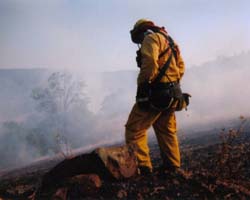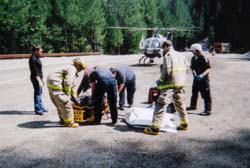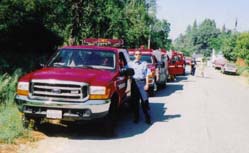Fighting ‘Old Man Fire’
Sean Ryan, 19, is the resident firefighter at the North San Juan Fire Protection District, Station 3, in the foothills of central California’s Sierra Nevada mountains. He begins his sophomore year at Sierra College this fall, where he is studying for a career in the fire service. He spoke by phone to WKCD this summer from his living quarters in the fire station.
 Living a Dream
Living a Dream
I officially joined the department when I was 16, during my junior year in high school. Many kids want to be a firefighter someday, and when I started I just saw it as a way to realize that dream.
Before the age of 18, I served as a junior firefighter. There are restrictions on your duties until you’re 18: you can’t drive the fire apparatus, you can’t do direct patient care or make the initial attack on a fire. But you do get to respond to calls and fill a support role.
Right now I’m the resident firefighter, so I live in the fire station. I have a bedroom, bathroom, and small kitchenette. Outside my living quarters is the bay with two fire engines, and right across the bay is the training room and department office. When my Captain and his wife moved out to their own house, the quarters sat empty. So I started spending some nights here, so I could go out on more calls. Eventually I asked the chief if I could live here permanently, and he said okay. So in return for free rent and utilities, I take care of the place, keep the quarters clean, cut the grass, etc. I love it—it’s the best. I’m having the time of my life.
 Responding to calls and fighting fires give you an incredible adrenaline rush. Plus, I really enjoy the feeling of helping people in need. I also enjoy the camaraderie within the department—which, no, is not at all affected by my age.
Responding to calls and fighting fires give you an incredible adrenaline rush. Plus, I really enjoy the feeling of helping people in need. I also enjoy the camaraderie within the department—which, no, is not at all affected by my age.
My most memorable call was probably my first structural fire—my first real taste of fighting “Old Man Fire.” The house was considered a save even though about two of the rooms were burnt pretty badly. The resident was so appreciative, and the trust he showed in us to go into his home—it was just a great feeling. It pretty much got me addicted to the firefighting experience.
The worst call I’ve gone on I can’t really talk about: patient confidentiality. But let’s just say that I’ve seen heads cracked open and blood smeared on highways, and this was way worse.
Ours is a small department. We have 25 active firefighters—all volunteers—and our response area is 75 square miles of heavy woodlands and rural populace. The department receives roughly 300 calls a year. Of those, the vast majority (78 percent) are for medical aid, such as heart attacks or trouble breathing. The next most frequent are vehicle accidents; only 8 percent are actual fires, both structural and wildland fires.
Each firefighter has at least one 12-hour duty shift a week. (I have two, plus I attend any calls that come in while I’m here at the residence.) During those 12 hours—say, from 6:00 Saturday night through 6:00 Sunday morning—if a call comes in, you have to drop whatever you’re doing and respond immediately.
Last February I was elected President of the Fire Association for the station by my peers. The job means I have to raise money to help support the firefighters and help represent the department in the community. It’s for a one-year term—I beat out one other guy in the election—and I can run again next year if I want to. As it stands now, I’ll probably run again.
Most the firefighters in our department are in their 30s or 40s. But a classmate of mine from middle school just joined the department, so now there’s another person my age. It’s not a problem being around so many older people. In fact, one of my best friends is another firefighter, and he’s 39! They like having me around, I guess, because I’ve got that youthful exuberance—plus I can lug the hose packs up hills. And I like being around them because of their experience and wisdom and greater maturity level.
Responsibilities and Duties
Training and Certification
 Plans for the Future
Plans for the Future
This summer I’m answering calls at the fire station, and I’m also working part-time doing maintenance, grounds-keeping at a local community center. I also work with another firefighter on high-end audio/video installation. That’s when wealthy people want their tv, stereo, and window blinds all on the same remote c0ntrol, so we wire the house to handle all that.
When I started classes last year at the community college, I intended on majoring in aeronautical engineering, but now I’m planning on a career in fire service. I really enjoy what I’m doing, so I figure I may as well have a job that I love.
At this point, I don’t believe I have any interest in being fire chief one day—I really don’t know how I’d like that. Fire chiefs have to be involved in the politics of the department, and that’s not what I like. There’s a lot of muddy water that can get stirred up in a fire station, which I try to stay clear of. It’s the firefighting I really enjoy.
Interview with Gerardo “Promise” Vargas
Interview with Billy Hallowell